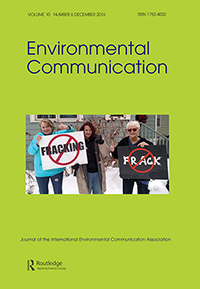
Abstract
In this article we examine in real time the political selective exposure process involved when the public confronted the “walrus haul out” of October 2014, a news event attributed by some climate change researchers to the effects of the climate change-driven reduction of Arctic sea ice. Analyzing data assessing the amount of major TV and cable news network coverage of the haul out, and evaluating public opinion data collected from a rolling cross-sectional survey of US adults take at the time, we show that coverage of this event was not equitably distributed across news media news sources, that exposure to news source is related to the respondents’ ideological dispositions, and that exposure to coverage of the walrus haul out is related to ideology, the selectivity of political news habits, and climate change knowledge. We conclude with a discussion of the apparent inevitability of selective exposure to media coverage of climate change-related events and the implications for effective climate change communication.
Authors
- Michael Hennessy
- Lauren Hawkins
- Kathleen Hall Jamieson

